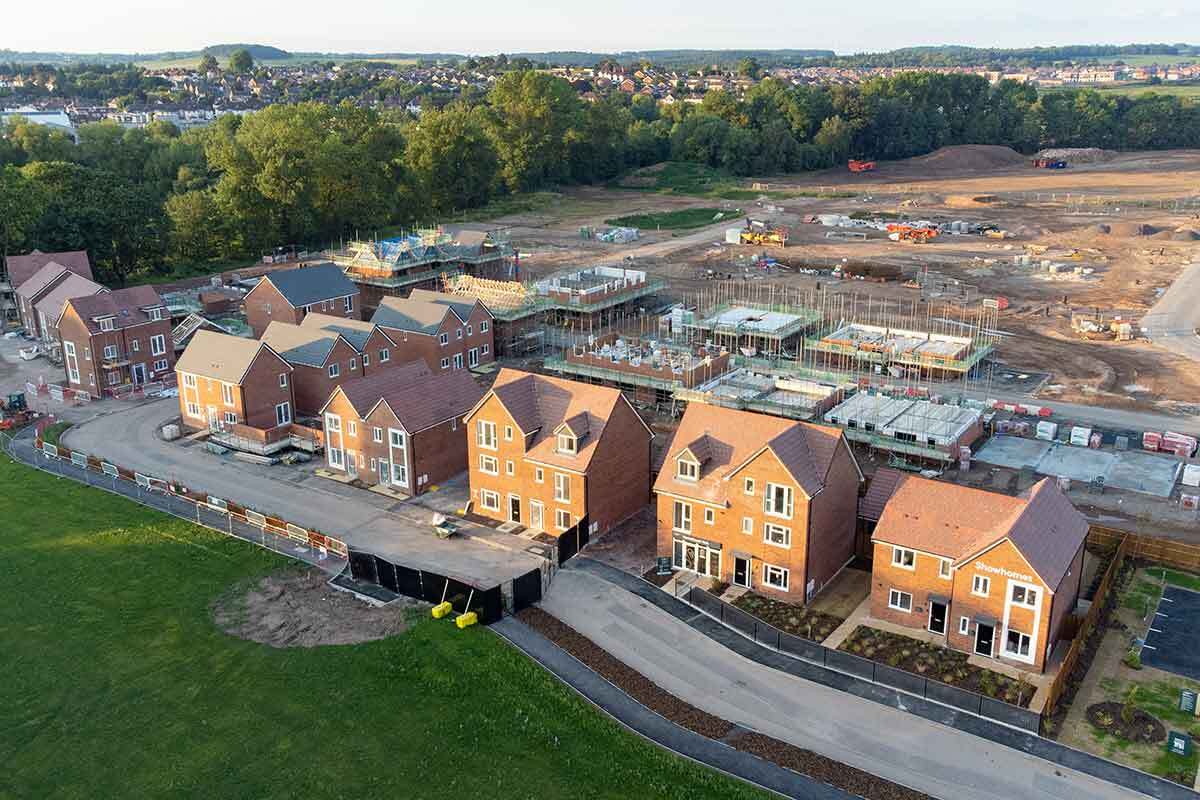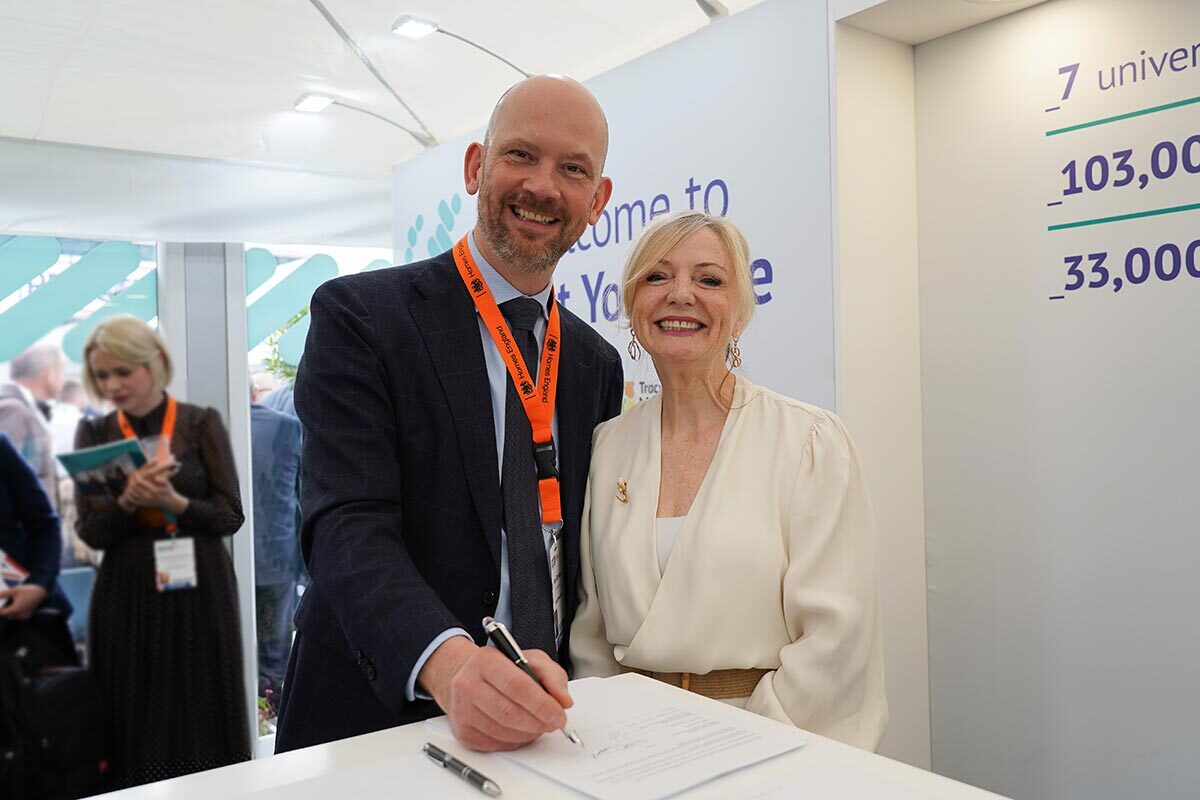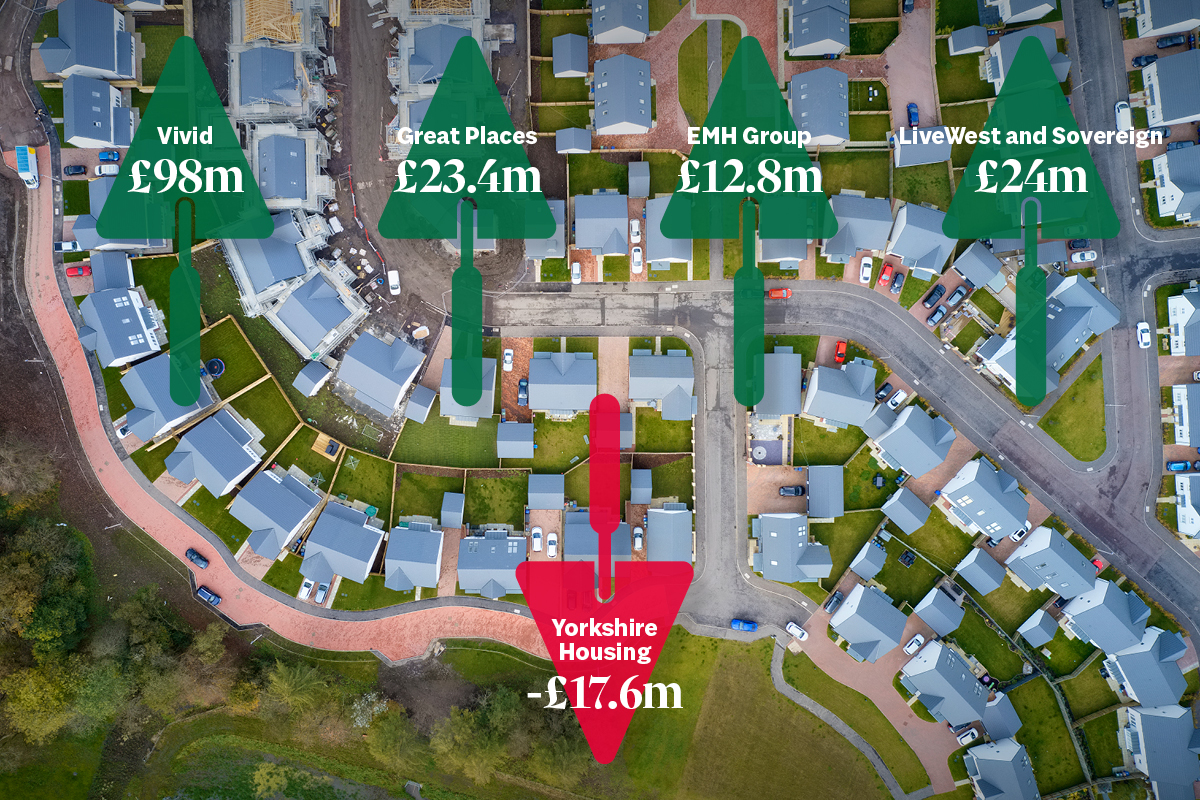Peter Denton on the future of Homes England
With a new five-year strategy putting more emphasis on regeneration, Homes England CEO Peter Denton tells James Riding that the government body has “all the love in the world” for housing associations. But what does the next half a decade really look like? And who is the man with one of the key roles in the sector on delivering affordable housing? Photography by Jon Enoch
“I’ve had five secretaries of state – if I count Michael Gove twice – and six housing ministers,” says Peter Denton, chief executive of Homes England, the agency that funds affordable housing. “There’s been a bit of volatility in the political arena: I’m stating the obvious facts.” Those days, he says, are “firmly behind”.
With Mr Gove snugly back in the driving seat at the Department for Levelling Up, Housing and Communities (DLUHC) until the next election, Homes England has published its five-year plan to advance the minister’s aims and policy objectives. It is a distinctly Govean document, underpinned by values of sustainability, quality, placemaking and the conviction that more affordable housing is a moral necessity.
So, given the chance to talk to Mr Denton ahead of the strategy being released, Inside Housing wanted to know: what does the next five years look like for the agency responsible for delivering affordable housing in England? Does Mr Denton have words of wisdom for landlords on how to cope with the pressures on their development programmes? And we also wanted to find out a bit more about the man who leads one of the most important agencies in the sector.
Mr Denton, 52, has a mellow Scottish accent reminiscent of the Aberdonian he reports to.
“My belief [is] with public service, you’ve always got to have something that you’re driven by yourself,” he says. At Hyde Group, the housing association he ran for two years after decades on the “dark side” of real estate private equity, his spur was the startling statistic that between 120,000 and 130,000 children are living in temporary accommodation. “That was the thing that I focused on, that got me going, and why I felt affordable housing was so important.”
Although he loved his tenure at Hyde (“I can’t tell you how enriching it was. Best job I ever had”), he came to Homes England in 2021 because he believed he could get more affordable homes built. “And I got spectacularly lucky, because Michael Gove is unequivocally committed to the provision of more affordable homes and more socially rented homes,” he says.
The agency’s most conspicuous offer in this regard is its Affordable Homes Programme (AHP). The current round of the programme is investing £7.5bn between 2021-26 to build affordable homes, much of it already allocated to housing providers. But, to get back to what the future looks like for Homes England, Mr Denton is also keen to turn the rest of Homes England’s capabilities towards supporting affordable housing.
The agency is currently working on around 1,000 sites using its own land (Homes England is one of the largest land buyers in the country and owns 9,000 hectares). On all these sites, Mr Denton says he has pushed colleagues to bump up the provision of affordable housing. Some of this has come from deploying not AHP grant but viability grant funding, such as £100m grant to unlock a challenging site around Bristol Temple Meads Station. Homes England provides lending for upfront infrastructure, often with high levels of affordable housing as part of the terms. It has also committed to providing cornerstone equity to get new affordable housing private investment funds going, such as M&G’s shared ownership fund and joint ventures such as Axa and Hyde’s.
But not all interventions require funding. Two years ago, he points out, when Sheffield was selected by the government as one of the first two levelling-up sites, the city was developing about 100 affordable homes a year. Homes England was able to convene 11 separate housing associations, the council and local businesses, that went on to form new partnerships. “We didn’t put any more money in Sheffield,” he says, “but we’ve taken the level of affordable delivery to about 900 homes a year… simply through working together.”
There is no getting away from it: it is a challenging time to be building affordable housing. Mr Denton says ministers are aware of “a lot of things coming together at exactly the same moment”: the cost of living crisis, the social rent cap, building safety repairs, materials cost inflation and the cost of debt, which for many housing associations has doubled.
“After the September wobble, the sector faced quite a lot of confidence issues,” he says. In response, the terms of the AHP will evolve. Last month, the agency issued new guidance, including social rent-specific grant rates, alongside the ability for councils to use grant funding on market sale acquisitions. “We have secured flexibilities that will look to support the sector better in these current times,” Mr Denton says, promising more detail soon.
The new Homes England strategy
- Greater focus on regeneration, to “go beyond” housing work and engage with the commercial real estate sector
- Greater focus on placemaking, bringing together “all of our assets” to support local leaders to deliver pride of place
- Forming joint ventures with more private sector investors to drive change at scale and pace, like the English Cities Fund with Muse and Legal & General
- Greater focus on diversifying and building capacity across the housing sector
- Quality, decency, good design and sustainability “must take centre stage”
- New key performance indicators to measure progress, such as number of jobs created, social value per pound of investment and number of households supported into homeownership
It has also been another sobering month for modular housing, as Legal & General stopped production at its Yorkshire factory. Homes England has long championed modular and invested in House, a joint venture between Sekisui and Urban Splash that collapsed in May 2022. Why, with so many demographic and technological advances trending in its favour, does modular remain so tough to crack?
“Whole factory building is really hard,” he concedes, “but it’s worth aiming for. Those economies of scale and that systemisation are incredibly important.” Homes England’s strategy document reaffirms its commitment to modern methods of construction (MMC): “It’s non-negotiable. We have to focus on making this work,” Mr Denton states.
Construction firms going bust is a problem well beyond MMC, and Mr Denton urges housing associations to reach out to Homes England for help. “We just don’t get used as much as we should,” he says. “If you’ve got contractors wobbling, come and talk to us. Because we might know them, we might be providing capital to them, we might be able to find other things that support them through this period. Equally, if they are wobbling and you’re concerned, let’s look at alternative options for their replacement if it happens.” He says Homes England is willing to use its statutory compulsory purchase order powers to support ambitious affordable housing providers. “Nothing would give us greater pleasure [than] to ensure that we keep these sites going,” he says.
He says he now feels “really strongly” about providing more build-to-rent homes for the private rented market on sites alongside houses for sale. At Hyde, he says, sites would be split between one-third affordable rent, one-third affordable ownership and one-third market sale. “If I was in a housing association now, I’d probably be wanting to see more build-to-rent in there as well, because the private sector needs good quality private rented.”
Earlier this year, there were reports Homes England was considering a name change. The agency is no stranger to reinvention, but Mr Denton says it will keep the moniker it has had since 2017. “We will continue to use the name Homes England,” he says, but you will find it using its new slogan “quite prominently”: “the Housing and Regeneration Agency”.
Homes England: the Housing and Regeneration Agency sounds a bit like a subpar Matt Damon thriller, but it does reflect the new strategy’s greater focus on regeneration. “It’s additive,” he says. At times over the past 40 years, the agency has seesawed between these roles, but “now there’s a clear mandate for both”.
The agency has already taken on significant regeneration projects, such as a 45-hectare site in York. A partnership with Network Rail will provide roads, bridges, a park, one million sq ft of commercial space and at least 2,500 new homes. Along with West Midlands Combined Authority, it has convinced the BBC to move its Midlands headquarters to Digbeth, Birmingham, and will build at least 1,000 homes nearby, 35% of which will be affordable.
Crudely, he says, the private sector should provide 80% of the capital for regeneration, while Homes England invests 20%. “But we’re happy to be the first 20%,” he says – with the first investor committed, it can help attract funding from others. Homes England can fund a masterplan and infrastructure, and at that point “we’ve derisked it and we’ve given confidence to the private sector to come in”.
Peter Denton’s CV
- Chief executive, Homes England (2021-present)
- Chief executive, The Hyde Group (2019-2021)
- Chief financial officer, The Hyde Group (2017-2019)
- Head of European special situations, Starwood Capital (2012-2016)
- Head of real estate finance, BNP Paribas (2011-2012)
- Head of London, Westdeutsche ImmobilienBank (2008-2011)
- Managing director, real estate finance EMEA, Barclays Capital (2007-2008)
- Managing director, head of European real estate origination, Eurohypo (1998-2007)
- Qualified accountant, Arthur Andersen (1994-1998)
Mr Denton feels the next step for housing associations is to immerse themselves fully in regeneration. With a wave of office buildings that need to be upgraded to energy efficiency standards hitting the market, and the continued challenges of retail, there will be opportunities for housing associations to be “engaged in regeneration activities in urban cores”, he says. “They’re involved in the residential, but they’re also involved in the new workspace, the new last mile logistics, the new park.”
And, as the housing and regeneration agency, Homes England can support those providers that want to move into a more ambitious placemaking role. “We desperately need housing associations and other private sector affordable providers to engage with wider regeneration and placemaking.”
Homes England is not just observing an uptick in council housebuilding and for-profit providers, but encouraging it too. “The agency has got to show all the love on Earth to the not-for-profit housing associations,” he says, but it also needs to diversify the delivery of affordable housing. “When I first joined the sector in 2017, it was anathema, the idea of for-profits. I think it’s now accepted as part of the furniture.”
The next step, he says, is to empower “a substantial increase” in councils building their own homes. Homes England is funding several pilot schemes with local authorities, as well as providing additional capacity. But these various types of developer need not be siloed, he says, pointing out that housing associations and for-profits are partnering up more and more.
If Homes England under Mr Denton has “all the love in the world” for housing associations, what do people in the sector think of him? David Cowans, former chief executive of Places for People, calls him “very pragmatic, very practical”. Mr Cowans adds: “He's open to the notion of placemaking, which I've been a huge fan of for many years, and open to the idea of a place being more than just a collection of houses” – and adds that he is generous with his time, if it advances those agenda issues.
Pete Gladwell, group social impact and investment director at L&G, says: "He's purpose-driven, and wants to bring the talents he has to serve that greater purpose. He's been a driving force for change in the sector, even before he joined Homes England. I used to love the times when he'd be at one of the Housing conferences in Manchester, and no one really knew who he was, and when some of the more ridiculous financial advisors were trying to persuade social landlords to do something, he'd just take them to pieces and point out all the flaws in it, from both a moral and financial side."
Homes England not only funds development but also manages 260,000 Help to Buy loans, a Building Safety Fund and a forthcoming cladding safety scheme. As its purview evolves even more, how does it avoid mission creep and make all its purview add up? Mr Denton says his mantra for the agency is 1+1=3. The task is to unite the programmes around a singular mission and get teams in the agency to work together to maximise opportunity: “We can achieve more, do more for people and for place, without necessarily needing more money, by being better and quicker at it,” he says. “If I bugger off in due course, and I’ve only achieved two things, which is more affordable homes and 1+1=3, then that’s a pretty good outcome for me.”
Peter Denton is speaking at the Housing 2023 conference in Manchester, which runs from 27-29 June
Sign up for our development and finance newsletter
Already have an account? Click here to manage your newsletters














